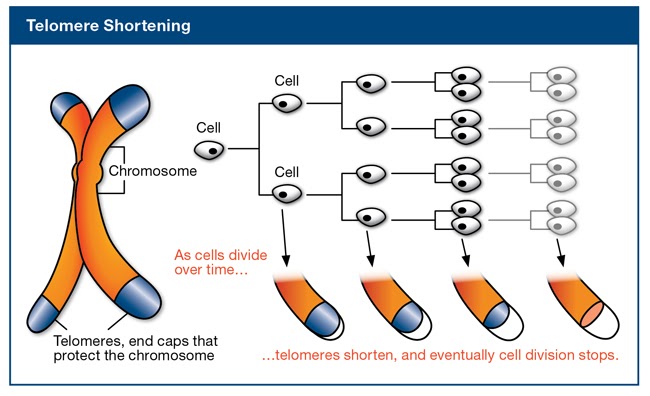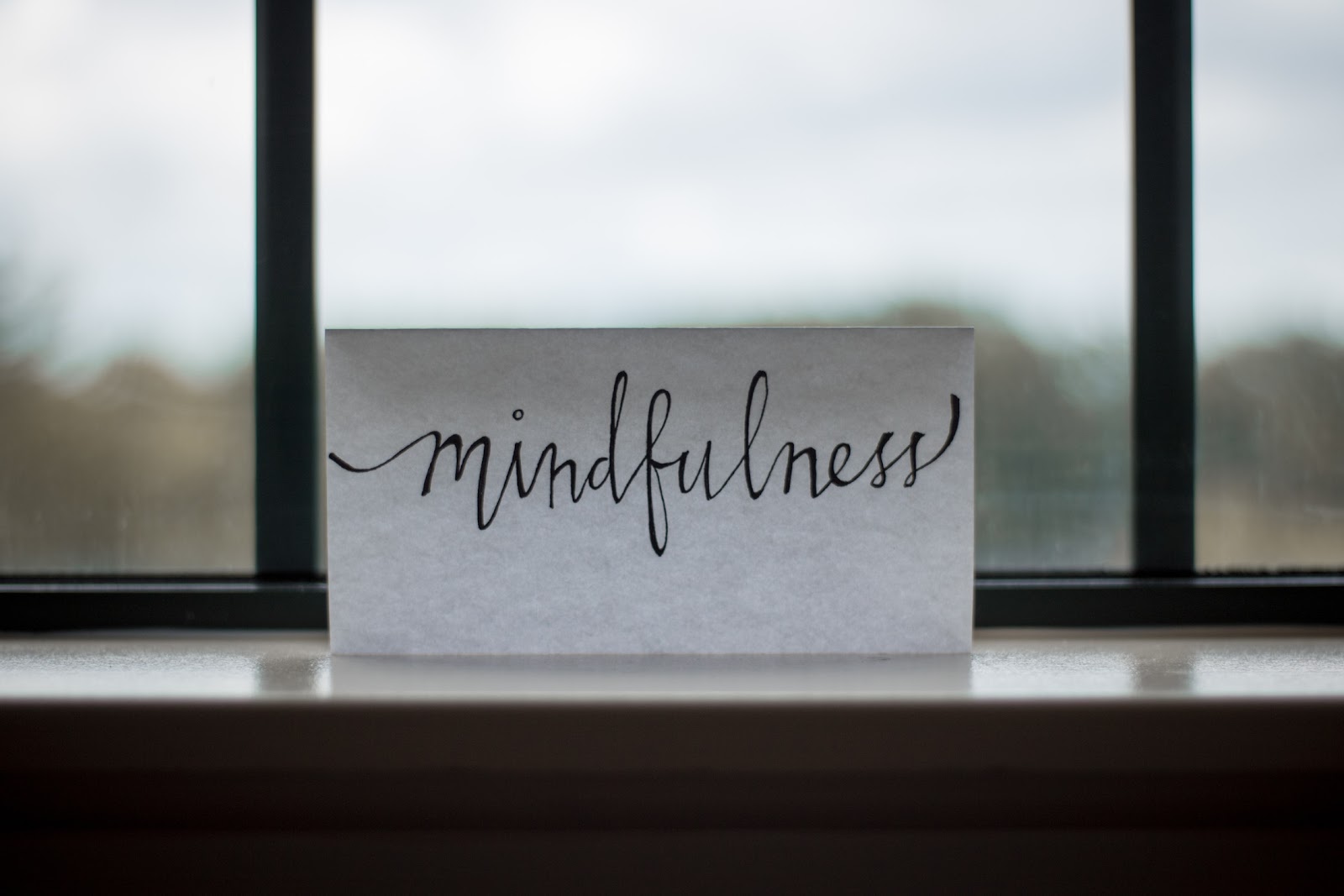Stress, Biological Aging, and Telomeres
Stress: It Doesn't Just Feel Like It’s Killing You
How Stress Shortens Telomeres Length and Leads to Early Aging
I have written extensively here at our blog about both the importance of reducing stress in achieving a vibrant, healthy, and long life, and also about the complicated role that telomeres have on the human lifespan.

In fact, I recently sent out to our Facebook followers a link to an article recently published by Stanford University, where researchers were able to successfully regenerate the length of telomeres in human cell lines. The research was not done on humans. Not even on lab animals. It was done in vitro. But it is still a huge feat. While many organisms are able to do this, humans—for the most part—do not.
Telomeres are the little end caps on our chromosomes. They are, essentially, a bit of DNA padding at the ends, so that when the DNA is copied to produce new cells, there is a margin of error. Each time the chromosome is copied, that bit of padding is shortened. Over time, and through repeated cell division, that padding becomes absent and the cell enters senescence, or "old age."
Many organisms, but not humans, rebuild this bit of code after cell division with the help of an enzyme called telomerase. But the healthy human adult does not do this. However, cancerous cells, because of their rapid cell division and growth, actually secrete telomerase (if it wasn't for the cancer cell's ability to lengthen its own telomeres, the cancerous cells would quickly die away in the body and the cancer would never be an issue). So simply increasing the amount of telomerase in the body is not the answer. It is still a major breakthrough when it happens (as in the above linked research), but it definitely is not the holy grail.

So where are we left? Well, in managing our stress. It turns out that stress is a major influencer in telomere length. We cannot add onto the length, and what is gone is gone, but we can preserve what is left.
This is actually a very similar concept as Prenatal Yuan Qi—the type of Qi that many confuse with Jing. Prenatal Yuan Qi is inherited 50% from our biological father and 50% from our biological mother. This particular Qi really is our deep-seated Qi, our vitality and our reproductive strength, which we carry throughout our lives. And once it's gone it's gone.
We can refine it and we can increase our Jing and our Postnatal Yuan Qi, but we cannot add to the Prenatal Qi. Stress and over stimulation (including coffee) dips into our Prenatal Yuan Qi, causing premature and accelerating of the aging process.
A study done at Brigham and Women's Hospital in Boston and published in the PLoS medical journal, "shows that a common form of anxiety, known as phobic anxiety, was associated with shorter telomeres in middle-aged and older women." While many people anecdotally know that stress causes premature aging in the body, this study is the first showing the biological damage that stress can have on the length of the telomeres themselves. As it stands, this is irreversible damage.
I’m Stressed Out About Being Stressed Out!
What Can Be Done To Reduce Our Levels of Stress?
Everyone knows how bad stress is for the body/mind/soul. We don't have to reiterate that here. But actually getting to the cause of stress and rooting it out of our lives is a complicated process, once that we are just beginning to understand. From as early as I can remember, I have always been a pretty high stress individual. Instead of finding ways to reduce stress in my life, I instead spent the majority of time trying to just find ways of appearing relaxed to others. But one day it struck me, I need to get a handle on this stress. For me, reducing stress in my life involves many different practices.

How I've Reduced Stress in My Life
Make a list, literally, of what causes you stress. Identify what is "worth it" and what is not "worth it." Cross off those things you deem not worth it, and train yourself to laugh or smile when they start to stress you out. This is a conscious process that takes time. It might even be a life-long practice, where the perfection lies in the practice itself. Catch the thought pattern, observe it, and laugh.
The "worth it" list? Stress is real and inevitable. So take that "worth it" list and turn it into a "to-do" list. Bills stressing you out. Pay them. A dreadful conversation with a friend? Have that conversation. Not being in shape? Go for a walk.
Turn the stressor into a manageable, actionable task.
Biologically, stress—as a physiological action—is actually a pretty useful adaptation. We see/hear/sense or otherwise perceive a threat, and we get an amazing surge of chemicals rushing through our bodies to deal with that stress. So we need to put that stress to action. It's when we sit and ruminate that stress becomes deleterious to our health. By transforming what causes us stress into an actionable list of tasks, we can employ that biological adaptation and put the stress to work for us.
Next, see how we fetishize stress in our culture. We need to break out of the 24/7 mentality. We will actually become more productive when we learn how to manage out time and our tasks, creating a clear schedule for work and for play and for relaxation. The next step is to create a work schedule.
Learn to be like bamboo. Bamboo sways and doesn't break. Sway more. Break less.
Stop drinking coffee. Coffee works because it initiates a stress response in the body. Really. It really does this. Can coffee be good for you? I don't know. I don't think so. But I do know that if there is a fire in the kitchen, I'm not going to throw gasoline on it.
Meditation and other internal practices (like Qi Gong). There is a favorite saying of mine about meditation, "Everyone should meditate for 15 minutes a day. Unless you don't have the time. Then you should meditate for an hour." If nothing else is done, the combination of meditation and Qi Gong, in my experience and practice, will have the most profound impact of reducing stress. You'll also see your face visibly transform as the stress begins to melt away. Try it, what do you have to lose?
Want to see the profound effect of stress on the face, do a search for " President Before and After."
What Does Mindfulness Training Actually Look Like?
The magazine Shambala Times published before and after pictures, showing what they called "a visual exploration of the physiological qualities of meditation practice." You can see one of them here.
Did I miss anything? Probably—let me know by leaving a comment.
Recent Posts
Understanding Our Forest Aurum Pine Pollen Nectar Tincture
Unlocking the Potency of Pine Pollen Forest Aurum Pine Pollen Nectar Tincture represents the c...
Unlocking the Secrets of Tongkat Ali: Tradition, Authenticity, and the Power of Natural Healing
Tongkat Ali: A Beacon of Authenticity in the World of Herbal Medicine In our quest to recover o...
Building Product Stacks and Cycles
Unlocking the Intricacies of Stacking, Combining, and Cycling Herbs and Products for Optimum Benefit...
Unlocking the Vital Role of Estradiol in Male Sexual Health: Looking Beyond Testosterone
Exploring the Complex Interplay of Estradiol and Androgens in Male Sexual HealthBeyond the Shadows o...
Witches' Qi Elixir: Eleven Cauldron Flavors
All Hallows Evening: Celebrating Growth, Death, Renewal, and the Mystical Cycles Eleven Cauldron...
Unstandardized Extracts
A Dedication to Excellence Over Quantity In the upcoming week, we are thrilled to reintroduce a...






